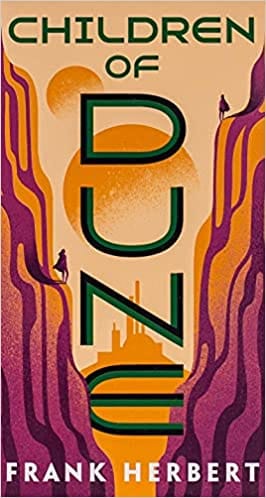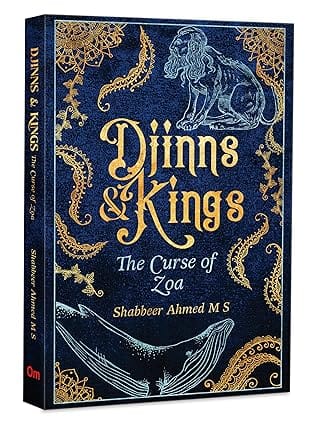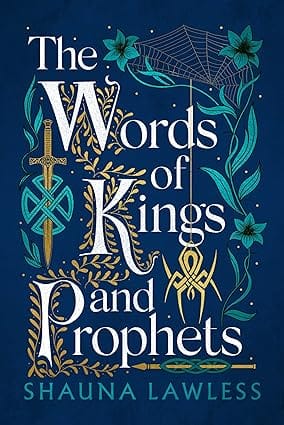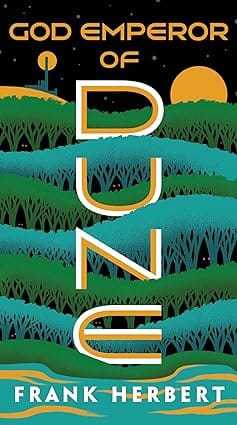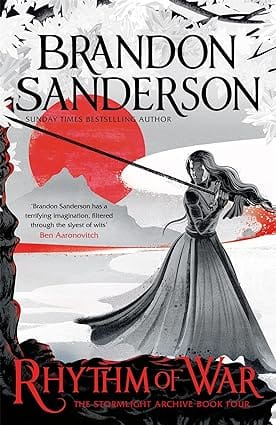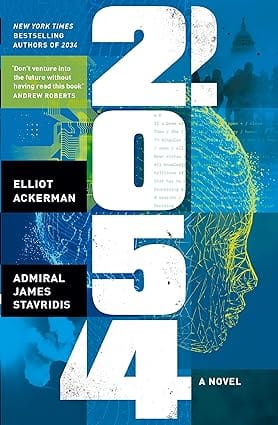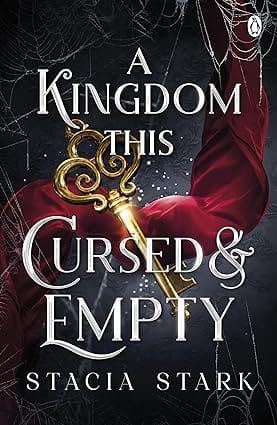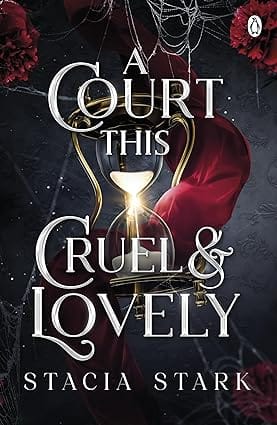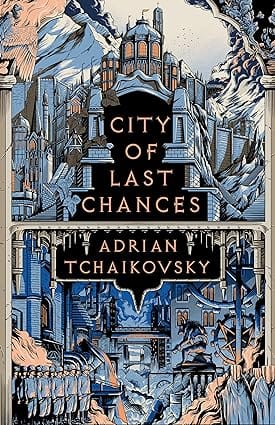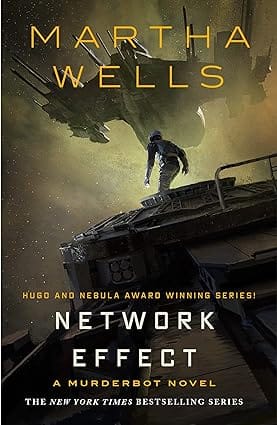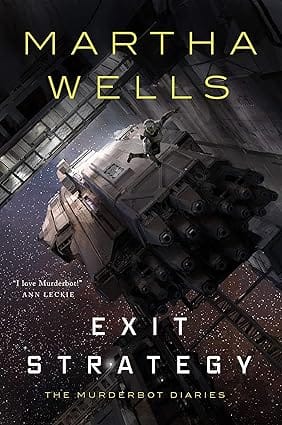-
Contemporary Fiction
- Contemporary Fiction
-
Children
- Children
-
Comics & Graphic Novels
- Comics & Graphic Novels
-
Non-Fiction
- Non-Fiction
-
Fiction
- Fiction
Book Three in the Magnificent Dune Chronicles—the Bestselling Science Fiction Adventure of All Time
The Children of Dune are twin siblings Leto and Ghanima Atreides, whose father, the Emperor Paul Muad’Dib, disappeared in the desert wastelands of Arrakis nine years ago. Like their father, the twins possess supernormal abilities—making them valuable to their manipulative aunt Alia, who rules the Empire in the name of House Atreides.
Facing treason and rebellion on two fronts, Alia’s rule is not absolute. The displaced House Corrino is plotting to regain the throne while the fanatical Fremen are being provoked into open revolt by the enigmatic figure known only as The Preacher. Alia believes that by obtaining the secrets of the twins’ prophetic visions, she can maintain control over her dynasty.
But Leto and Ghanima have their own plans for their visions—and their destinies....
Review
“A major event.”—Los Angeles Times
“Ranging from palace intrigue and desert chases to religious speculation and confrontations with the supreme intelligence of the universe, there is something here for all science fiction fans.”—Publishers Weekly
“Herbert adds enough new twists and turns to the ongoing saga that familiarity with the recurring elements brings pleasure.”—Challenging Destiny
Praise for Dune
“I know nothing comparable to it except Lord of the Rings.”—Arthur C. Clarke
“A portrayal of an alien society more complete and deeply detailed than any other author in the field has managed...a story absorbing equally for its action and philosophical vistas.”—The Washington Post Book World
“One of the monuments of modern science fiction.”—Chicago Tribune
“Powerful, convincing, and most ingenious.”—Robert A. Heinlein
“Herbert’s creation of this universe, with its intricate development and analysis of ecology, religion, politics and philosophy, remains one of the supreme and seminal achievements in science fiction.”—Louisville Times
About the Author
In 1952, Herbert began publishing science fiction with “Looking for Something?” in Startling Stories. But his emergence as a writer of major stature did not occur until 1965, with the publication of Dune. Dune Messiah, Children of Dune, God Emperor of Dune, Heretics of Dune, and Chapterhouse: Dune followed, completing the saga that the Chicago Tribune would call “one of the monuments of modern science fiction.” Herbert is also the author of some twenty other books, including The White Plague, The Dosadi Experiment, and Destination: Void. He died in 1986.
Excerpt. © Reprinted by permission. All rights reserved.
Table of Contents
Title Page
Copyright Page
Dedication
INTRODUCTION
Church and State, scientific reason and faith, the individual and his ...
Books by Frank Herbert
THE BOOK OF FRANK HERBERT
DESTINATION VOID (revised edition)
DIRECT DESCENT
THE DOSADI EXPERIMENT
EYE
THE EYES OF HEISENBERG
THE GODMAKERS
THE GREEN BRAIN
THE MAKER OF DUNE
THE SANTAROGA BARRIER
SOUL CATCHER
WHIPPING STAR
THE WHITE PLAGUE
THE WORLDS OF FRANK HERBERT
MAN OF TWO WORLDS
(with Brian Herbert)
The Dune Chronicles
DUNE
DUNE MESSIAH
CHILDREN OF DUNE
GOD EMPEROR OF DUNE
HERETICS OF DUNE
CHAPTERHOUSE: DUNE
Books by Frank Herbert and Bill Ransom
THE JESUS INCIDENT
THE LAZARUS EFFECT
THE ASCENSION FACTOR
Books edited by Brian Herbert
THE NOTEBOOKS OF FRANK HERBERT’S DUNE
SONGS OF MUAD’DIB
THE BERKLEY PUBLISHING GROUP
Published by the Penguin Group
Penguin Group (USA) Inc.
375 Hudson Street, New York, New York 10014, USA
Penguin Group (Canada), 90 Eglinton Avenue East, Suite 700, Toronto, Ontario M4P 2Y3, Canada (a division of Pearson Penguin Canada Inc.)
Penguin Books Ltd., 80 Strand, London WC2R 0RL, England
Penguin Group Ireland, 25 St. Stephen’s Green, Dublin 2, Ireland (a division of Penguin Books Ltd.) Penguin Group (Australia), 250 Camberwell Road, Camberwell, Victoria 3124, Australia (a division of Pearson Australia Group Pty. Ltd.)
Penguin Books India Pvt. Ltd., 11 Community Centre, Panchsheel Park, New Delhi—110 017, India
Penguin Group (NZ), 67 Apollo Drive, Rosedale, North Shore 0632, New Zealand
(a division of Pearson New Zealand Ltd.)
Penguin Books (South Africa) (Pty.) Ltd., 24 Sturdee Avenue, Rosebank, Johannesburg 2196,
South Africa
Penguin Books Ltd., Registered Offices: 80 Strand, London WC2R 0RL, England
This is a work of fiction. Names, characters, places, and incidents either are the product of the author’s imagination or are used fictitiously, and any resemblance to actual persons, living or dead, business establishments, events, or locales is entirely coincidental. The publisher does not have any control over and does not assume any responsibility for author or third-party websites or their content.
Published by arrangement with Herbert Properties LLC.
Copyright © 1976 by Frank Herbert.
All rights reserved.
No part of this book may be reproduced, scanned, or distributed in any printed or electronic form without permission. Please do not participate in or encourage piracy of copyrighted materials in violation of the author’s rights. Purchase only authorized editions.
ACE and the “A” design are trademarks belonging to Penguin Group (USA) Inc.
ISBN: 9781440630514
1. Dune (Imaginary place)—Fiction. I. Title.
PS3558.E63C49 2008
813’.54—dc22 2008009348
FOR BEV: Out of the wonderful commitment of our love and to share her beauty and her wisdom for she truly inspired this book.
INTRODUCTION
by Brian Herbert
Frank Herbert had a remarkably inventive and original mind. In his first novel, The Dragon in the Sea (1956), he came up with the concept of containerized shipping, an idea that the Japanese later commercialized to enormous success. Dune, only his second novel, was published in 1965. A complex, revolutionary work, it featured layers of ecology, philosophy, history, religion, and politics beneath the epic tale of the heroic Paul Atreides.
By 1968, five more of Frank Herbert’s novels had been published: Destination: Void, The Eyes of Heisenberg, The Green Brain, The Heaven Makers, and The Santaroga Barrier. All the while, the popularity of Dune was growing, particularly among university intellectuals who were impressed by the complex messages interwoven into the great adventure story. The novel became a textbook for many classes. The Whole Earth Catalog extolled it as an environmental handbook.
As his eldest son, I didn’t even know what my father had created. In 1966, I was hitchhiking near Carmel, California, and a young hippie couple gave me a ride in their Volkswagen Beetle. I was sitting in the back of the small car as it puttered along, and we were chatting. I told them that my dad was a newspaperman for the San Francisco Examiner and that he had written a couple of books.
“Oh?” the young man said. “What did he write?”
“Uh, Dune,” I said.
“Dune!” He was so excited that he pulled the car off to the side of the road. “Your dad is Frank Herbert?”
Hesitantly I replied, “Yeah.”
“Dune! I love that book! One of my friends at college turned me on to it. Wow! I can’t believe it!”
I was dumbfounded. As I wrote in Dreamer of Dune, my biography of Frank Herbert, my bearded father and I did not get along well in those years. I was a rebellious teenager, and we had one shouting argument after another. The relationship seemed hopeless. But Dad had apparently written something remarkable. Even so, he was not making much money from his writing or from his newspaper job. As a family, we were on the poor side of average, and some of our relatives considered my father something of a black sheep. He was eccentric, they said, and went his own way. How little did they know. How little did I know. I hadn‘t even read the novel yet.
Dune Messiah, Frank Herbert’s first sequel to Dune, was published in 1969. In that book, he flipped over what he called the “myth of the hero” and showed the dark side of Paul Atreides. Some readers didn’t understand it. Why would the author do that to his great hero? In interviews, Dad spent years afterward explaining why, and his reasons were sound. He believed that charismatic leaders could be dangerous because they could lead their followers off the edge of a cliff.
His alternate way of looking at the universe fascinated many readers anyway, and they couldn’t wait to see where he was going with the series. He was developing a core readership. In the early 1970s, Frank Herbert became involved with the environmental movement, just as the popularity of the novel Dune was skyrocketing. He spoke on college campuses all over the country. Readers wanted even more sequels, but Dad took his time with the third book, wanting the next novel in the series to be as skillfully written as possible. In conjunction with the first Earth Day, Dad wrote entries for and edited New World or No World, a book about the importance of protecting the environment. He followed that with two novels, Soul Catcher and The Godmakers, and then a third, Hellstrom’s Hive, which had a movie tie-in. His book Threshold: The Blue Angels Experience was also published with a film connection.
By 1976, Frank Herbert had completed his long-awaited sequel, which he titled Children of Dune. A four-part Analogy serialization of the novel early that year was a resounding success, causing issues to sell out at news-stands. Letters poured in from excited fans who loved the story.
For months, David Hartwell, Dad’s astute editor at G. P. Putnam’s Sons, had been trying to convince company management that they were not printing enough copies, that when Children of Dune was printed soon in hardcover, it was going to be a national best seller purchased by more than science fiction fans. Like Dune, it would be a genre buster, he said.
Dune itself had not made it onto very many best-seller lists since its popularity had been a gradual groundswell. Its sales since publication were impressive, though, and Dune Messiah had sold relatively well. But Dune Messiah hadn’t been favorably received by the critics, and consensus held that its sales came on the coattails of Dune. Would Children of Dune be an even bigger critical disappointment than Dune Messiah?
There had never been a hardcover science fiction best seller, so Putnam management proceeded with extreme caution. Suddenly the Analog results provided David Hartwell with the necessary ammunition. Putnam increased the first print run to 75,000 copies, more than any science fiction hardcover printing in history. Publication was scheduled for later in the year, after completion of the magazine serialization.
When Children of Dune came out in hardback in 1976, it was an instant best seller. True to the prediction of David Hartwell and the gut feeling of my father, it became the top-selling hardback in science fiction history up to that time . . . more than 100,000 copies in a few months. When the novel came out in paperback the following year, Berkley Books initially printed 750,000 copies. That wasn’t half enough, and they went back to press. Six months after the release of the paperback, Dad said paperback sales were approaching two million copies.
“It’s a runaway best seller,” he told me in a telephone conversation. Dad enjoyed this phrase, and I heard it often in the ensuing years regarding his numerous best sellers.
At the age of fifty-five, Dad went on his first book tour, and it was a big one—twenty-one cities in thirty days, including an appearance on The Today Show in New York City with fellow science fiction writers Frederik Pohl and Lester del Rey. The Literary Guild made arrangements to offer all three books of the Dune trilogy in a boxed hardbound set.
At the vanguard of an explosive growth of sales in science fiction, Frank Herbert blazed the trail for other writers in the genre. After the phenomenal success of the Dune series, Isaac Asimov, Arthur C. Clarke, Robert A. Heinlein, Ray Bradbury, and other science fiction writers had national hardcover best sellers.
Children of Dune is an exciting, vividly imagined novel. It is Frank Herbert at the top of his craft.
Brian Herbert
Seattle, Washington
January 11, 2008
* * *
Muad’Dib’s teachings have become the playground of scholastics, of the superstitious and the corrupt. He taught a balanced way of life, a philosophy with which a human can meet problems arising from an ever-changing universe. He said humankind is still evolving, in a process which will never end. He said this evolution moves on changing principles which are known only to eternity. How can corrupted reasoning play with such an essence?
—WORDS OF THE MENTAT DUNCAN IDAHO
A spot of light appeared on the deep red rug which covered the raw rock of the cave floor. The light glowed without apparent source, having its existence only on the red fabric surface woven of spice fiber. A questing circle about two centimeters in diameter, it moved erratically—now elongated, now an oval. Encountering the deep green side of a bed, it leaped upward, folded itself across the bed’s surface.
Beneath the green covering lay a child with rusty hair, face still round with baby fat, a generous mouth—a figure lacking the lean sparseness of Fremen tradition, but not as water-fat as an off-worlder. As the light passed across closed eyelids, the small figure stirred. The light winked out.
Now there was only the sound of even breathing and, faint behind it, a reassuring drip-drip-drip of water collecting in a catch-basin from the windstill far above the cave.
Again the light appeared in the chamber—slightly larger, a few lumens brighter. This time there was a suggestion of source and movement to it: a hooded figure filled the arched doorway at the chamber’s edge and the light originated there. Once more the light flowed around the chamber, testing, questing. There was a sense of menace in it, a restless dissatisfaction. It avoided the sleeping child, paused on the gridded air inlet at an upper corner, probed a bulge in the green and gold wall hangings which softened the enclosing rock.
Presently the light winked out. The hooded figure moved with a betraying swish of fabric, took up a station at one side of the arched doorway. Anyone aware of the routine here in Sietch Tabr would have suspected at once that this must be Stilgar, Naib of the Sietch, guardian of the orphaned twins who would one day take up the mantle of their father, Paul Muad’Dib. Stilgar often made night inspections of the twins’ quarters, always going first to the chamber where Ghanima slept and ending here in the adjoining room, where he could reassure himself that Leto was not threatened.
I’m an old fool, Stilgar thought.
He fingered the cold surface of the light projector before restoring it to the loop in his belt sash. The projector irritated him even while he depended upon it. The thing was a subtle instrument of the Imperium, a device to detect the presence of large living bodies. It had shown only the sleeping children in the royal bedchambers.
Stilgar knew his thoughts and emotions were like the light. He could not still a restless inner projection. Some greater power controlled that movement. It projected him into this moment where he sensed the accumulated peril. Here lay the magnet for dreams of grandeur throughout the known universe. Here lay temporal riches, secular authority and that most powerful of all mystic talismans: the divine authenticity of Muad’Dib’s religious bequest. In these twins—Leto and his sister Ghanima—an awesome power focused. While they lived, Muad’Dib, though dead, lived in them.
These were not merely nine-year-old children; they were a natural force, objects of veneration and fear. They were the children of Paul Atreides, who had become Muad’Dib, the Mahdi of all the Fremen. Muad’Dib had ignited an explosion of humanity; Fremen had spread from this planet in a jihad, carrying their fervor across the human universe in a wave of religious government whose scope and ubiquitous authority had left its mark on every planet.
Yet these children of Muad’Dib are flesh and blood, Stilgar thought. Two simple thrusts of my knife would still their hearts. Their water would return to the tribe.
His wayward mind fell into turmoil at such a thought.
To kill Muad’Dib’s children!
But the years had made him wise in introspection. Stilgar knew the origin of such a terrible thought. It came from the left hand of the damned, not from the right hand of the blessed. The ayat and burhan of Life held few mysteries for him. Once he’d been proud to think of himself as Fremen, to think of the desert as a friend, to name his planet Dune in his thoughts and not Arrakis, as it was marked on all of the Imperial star charts.
How simple things were when our Messiah was only a dream, he thought. By finding our Mahdi we loosed upon the universe countless messianic dreams. Every people subjugated by the jihad now dreams of a leader to come.
Stilgar glanced into the darkened bedchamber.
If my knife liberated all of those people, would they make a messiah of me?
Leto could be heard stirring restlessly in his bed.
Stilgar sighed. He had never known the Atreides grandfather whose name this child had taken. But many said the moral strength of Muad’Dib had come from that source. Would that terrifying quality of rightness skip a generation now? Stilgar found himself unable to answer this question.
He thought: Sietch Tabr is mine. I rule here. I am a Naib of the Fremen. Without me there would have been no Muad’Dib. These twins, now . . . through Chani, their mother and my kinswoman, my blood flows in their veins. I am there with Muad’Dib and Chani and all the others. What have we done to our universe?
Stilgar could not explain why such thoughts came to him in the night and why they made him feel so guilty. He crouched within his hooded robe. Reality was not at all like the dream. The Friendly Desert, which once had spread from pole to pole, was reduced to half its former size. The mythic paradise of spreading greenery filled him with dismay. It was not like the dream. And as his planet changed, he knew he had changed. He had become a far more subtle person than the one-time sietch chieftain. He was aware now of many things—of statecraft and profound consequences in the smallest decisions. Yet he felt this knowledge and subtlety as a thin veneer covering an iron core of simpler, more deterministic awareness. And that older core called out to him, pleaded with him for a return to cleaner values.
The morning sounds of the sietch began intruding upon his thoughts. People were beginning to move about in the cavern. He felt a breeze against his cheeks: people were going out through the doorseals into the predawn darkness. The breeze spoke of carelessness as it spoke of the time. Warren dwellers no longer maintained the tight water discipline of the old days. Why should they, when rain had been recorded on this planet, when clouds were seen, when eight Fremen had been inundated and killed by a flash flood in a wadi? Until that event, the word drowned had not existed in the language of Dune. But this was no longer Dune; this was Arrakis . . . and it was the morning of an eventful day.
He thought: Jessica, mother of Muad’Dib and grandmother of these royal twins, returns to our planet today. Why does she end her self-imposed exile at this time? Why does she leave the softness and security of Caladan for the dangers of Arrakis?
And there were other worries: Would she sense Stilgar’s doubts? She was a Bene Gesserit witch, graduate of the Sisterhood’s deepest training, and a Reverend Mother in her own right. Such females were acute and they were dangerous. Would she order him to fall upon his own knife as the Umma-Protector of Liet-Kynes had been ordered?
Would I obey her? he wondered.
He could not answer that question, but now he thought about Liet-Kynes, the planetologist who had first dreamed of transforming the planetwide desert of Dune into the human-supportive green planet which it was becoming. Liet-Kynes had been Chani’s father. Without him there would have been no dream, no Chani, no royal twins. The workings of this fragile chain dismayed Stilgar.
How have we met in this place? he asked himself. How have we combined? For what purpose? Is it my duty to end it all, to shatter that great combination?
Stilgar admitted the terrible urging within him now. He could make that choice, denying love and family to do what a Naib must do on occasion: make a deadly decision for the good of the tribe. By one view, such a murder represented ultimate betrayal and atrocity. To kill mere children! Yet they were not mere children. They had eaten melange, had shared in the sietch orgy, had probed the desert for sandtrout and played the other games of Fremen children. . . . And they sat in the Royal Council. Children of such tender years, yet wise enough to sit in the Council. They might be children in flesh, but they were ancient in experience, born with a totality of genetic memory, a terrifying awareness which set their Aunt Alia and themselves apart from all other living humans.
Many times in many nights had Stilgar found his mind circling this difference shared by the twins and their aunt; many times had he been awakened from sleep by these torments, coming here to the twins’ bedchambers with his dreams unfinished. Now his doubts came to focus. Failure to make a decision was in itself a decision—he knew this. These twins and their aunt had awakened in the womb, knowing there all of the memories passed on to them by their ancestors. Spice addiction had done this, spice addiction of the mothers—the Lady Jessica and Chani. The Lady Jessica had borne a son, Muad’Dib, before her addiction. Alia had come after the addiction. That was clear in retrospect. The countless generations of selective breeding directed by the Bene Gesserits had achieved Muad’Dib, but nowhere in the Sisterhood’s plans had they allowed for melange. Oh, they knew about this possibility, but they feared it and called it Abomination. That was the most dismaying fact. Abomination. They must possess reasons for such a judgment. And if they said Alia was an Abomination, then that must apply equally to the twins, because Chani, too, had been addicted, her body saturated with spice, and her genes had somehow complemented those of Muad’Dib.
Stilgar’s thoughts moved in ferment. There could be no doubt these twins went beyond their father. But in which direction? The boy spoke of an ability to be his father—and had proved it. Even as an infant, Leto had revealed memories which only Muad’Dib should have known. Were there other ancestors waiting in that vast spectrum of memories—ancestors whose beliefs and habits created unspeakable dangers for living humans?
Abominations, the holy witches of the Bene Gesserit said. Yet the Sisterhood coveted the genophase of these children. The witches wanted sperm and ovum without the disturbing flesh which carried them. Was that why the Lady Jessica returned at this time? She had broken with the Sisterhood to support her Ducal mate, but rumor said she had returned to the Bene Gesserit ways.
I could end all of these dreams, Stilgar thought. How simple it would be.
And yet again he wondered at himself that he could contemplate such a choice. Were Muad’Dib’s twins responsible for the reality which obliterated the dreams of others? No. They were merely the lens through which light poured to reveal new shapes in the universe.
In torment, his mind reverted to primary Fremen beliefs, and he thought: God’s command comes; so seek not to hasten it. God’s it is to show the way; and some do swerve from it.
It was the religion of Muad’Dib which upset Stilgar most. Why did they make a god of Muad’Dib? Why deify a man known to be flesh? Muad’Dib’s Golden Elixir of Life had created a bureaucratic monster which sat astride human affairs. Government and religion united, and breaking a law became sin. A smell of blasphemy arose like smoke around any questioning of governmental edicts. The guilt of rebellion invoked hellfire and self-righteous judgments.
Yet it was men who created these governmental edicts.
Stilgar shook his head sadly, not seeing the attendants who had moved into the Royal Antechamber for their morning duties.
He fingered the crysknife at his waist, thinking of the past it symbolized, thinking that more than once he had sympathized with rebels whose abortive uprisings had been crushed by his own orders. Confusion washed through his mind and he wished he knew how to obliterate it, returning to the simplicities represented by the knife. But the universe would not turn backward. It was a great engine projected upon the grey void of nonexistence. His knife, if it brought the deaths of the twins, would only reverberate against that void, weaving new complexities to echo through human history, creating new surges of chaos, inviting humankind to attempt other forms of order and disorder.
Stilgar sighed, growing aware of the movements around him. Yes, these attendants represented a kind of order which was bound around Muad’Dib’s twins. They moved from one moment to the next, meeting whatever necessities occurred there. Best to emulate them, Stilgar told himself. Best meet what comes when it comes.
I am an attendant yet, he told himself. And my master is God the Merciful, the Compassionate. And he quoted to himself: “Surely, We have put on their necks fetters up to the chin, so their heads are raised; and We have put before them a barrier and behind them a barrier; and We have covered them, so they do not see.”
Thus was it written in the old Fremen religion.
Stilgar nodded to himself.
To see, to anticipate the next moment as Muad’Dib had done with his awesome visions of the future, added a counterforce to human affairs. It created new places for decisions. To be unfettered, yes, that might well indicate a whim of God. Another complexity beyond ordinary human reach.
Stilgar removed his hand from the knife. His fingers tingled with remembrance of it. But the blade which once had glistened in a sandworm’s gaping mouth remained in its sheath. Stilgar knew he would not draw this blade now to kill the twins. He had reached a decision. Better to retain that one old virtue which he still cherished: loyalty. Better the complexities one thought he knew than the complexities which defied understanding. Better the now than the future of a dream. The bitter taste in his mouth told Stilgar how empty and revolting some dreams could be.
No! No more dreams!
* * *
CHALLENGE: “Have you seen The Preacher?”RESPONSE: “I have seen a sandworm.”
CHALLENGE: “What about that sandworm?”
RESPONSE: “It gives us the air we breathe.”
CHALLENGE: “Then why do we destroy its land?”
RESPONSE: “Because Shai-Hulud [sandworm deified] orders it.”
—RIDDLES OF ARRAKIS BY HARQ AL-ADA
As was the Fremen custom, the Atreides twins arose an hour before dawn. They yawned and stretched in secret unison in their adjoining chambers, feeling the activity of the cave-warren around them. They could hear attendants in the antechamber preparing breakfast, a simple gruel with dates and nuts blended in liquid skimmed from partially fermented spice. There were glowglobes in the antechamber and a soft yellow light entered through the open archways of the bedchambers. The twins dressed swiftly in the soft light, each hearing the other nearby. As they had agreed, they donned stillsuits against the desert’s parching winds.
Presently the royal pair met in the antechamber, noting the sudden stillness of the attendants. Leto, it was observed, wore a black-edged tan cape over his stillsuit’s grey slickness. His sister wore a green cape. The neck of each cape was held by a clasp in the form of an Atreides hawk—gold with red jewels for eyes.
Seeing this finery, Harah, who was one of Stilgar’s wives, said: “I see you have dressed to honor your grandmother.” Leto picked up his breakfast bowl before looking at Harah’s dark and wind-creased face. He shook his head. Then: “How do you know it’s not ourselves we honor?”
Harah met his taun
- Home
- Fiction
- Sci Fi And Fantasy
- Children Of Dune: 3
Children Of Dune: 3
SIZE GUIDE
- ISBN: 9780593098240
- Author: Frank Herbert
- Publisher: Ace
- Pages: 624
- Format: Paperback
Book Description
Book Three in the Magnificent Dune Chronicles—the Bestselling Science Fiction Adventure of All Time
The Children of Dune are twin siblings Leto and Ghanima Atreides, whose father, the Emperor Paul Muad’Dib, disappeared in the desert wastelands of Arrakis nine years ago. Like their father, the twins possess supernormal abilities—making them valuable to their manipulative aunt Alia, who rules the Empire in the name of House Atreides.
Facing treason and rebellion on two fronts, Alia’s rule is not absolute. The displaced House Corrino is plotting to regain the throne while the fanatical Fremen are being provoked into open revolt by the enigmatic figure known only as The Preacher. Alia believes that by obtaining the secrets of the twins’ prophetic visions, she can maintain control over her dynasty.
But Leto and Ghanima have their own plans for their visions—and their destinies....
Review
“A major event.”—Los Angeles Times
“Ranging from palace intrigue and desert chases to religious speculation and confrontations with the supreme intelligence of the universe, there is something here for all science fiction fans.”—Publishers Weekly
“Herbert adds enough new twists and turns to the ongoing saga that familiarity with the recurring elements brings pleasure.”—Challenging Destiny
Praise for Dune
“I know nothing comparable to it except Lord of the Rings.”—Arthur C. Clarke
“A portrayal of an alien society more complete and deeply detailed than any other author in the field has managed...a story absorbing equally for its action and philosophical vistas.”—The Washington Post Book World
“One of the monuments of modern science fiction.”—Chicago Tribune
“Powerful, convincing, and most ingenious.”—Robert A. Heinlein
“Herbert’s creation of this universe, with its intricate development and analysis of ecology, religion, politics and philosophy, remains one of the supreme and seminal achievements in science fiction.”—Louisville Times
About the Author
In 1952, Herbert began publishing science fiction with “Looking for Something?” in Startling Stories. But his emergence as a writer of major stature did not occur until 1965, with the publication of Dune. Dune Messiah, Children of Dune, God Emperor of Dune, Heretics of Dune, and Chapterhouse: Dune followed, completing the saga that the Chicago Tribune would call “one of the monuments of modern science fiction.” Herbert is also the author of some twenty other books, including The White Plague, The Dosadi Experiment, and Destination: Void. He died in 1986.
Excerpt. © Reprinted by permission. All rights reserved.
Table of Contents
Title Page
Copyright Page
Dedication
INTRODUCTION
Church and State, scientific reason and faith, the individual and his ...
Books by Frank Herbert
THE BOOK OF FRANK HERBERT
DESTINATION VOID (revised edition)
DIRECT DESCENT
THE DOSADI EXPERIMENT
EYE
THE EYES OF HEISENBERG
THE GODMAKERS
THE GREEN BRAIN
THE MAKER OF DUNE
THE SANTAROGA BARRIER
SOUL CATCHER
WHIPPING STAR
THE WHITE PLAGUE
THE WORLDS OF FRANK HERBERT
MAN OF TWO WORLDS
(with Brian Herbert)
The Dune Chronicles
DUNE
DUNE MESSIAH
CHILDREN OF DUNE
GOD EMPEROR OF DUNE
HERETICS OF DUNE
CHAPTERHOUSE: DUNE
Books by Frank Herbert and Bill Ransom
THE JESUS INCIDENT
THE LAZARUS EFFECT
THE ASCENSION FACTOR
Books edited by Brian Herbert
THE NOTEBOOKS OF FRANK HERBERT’S DUNE
SONGS OF MUAD’DIB
THE BERKLEY PUBLISHING GROUP
Published by the Penguin Group
Penguin Group (USA) Inc.
375 Hudson Street, New York, New York 10014, USA
Penguin Group (Canada), 90 Eglinton Avenue East, Suite 700, Toronto, Ontario M4P 2Y3, Canada (a division of Pearson Penguin Canada Inc.)
Penguin Books Ltd., 80 Strand, London WC2R 0RL, England
Penguin Group Ireland, 25 St. Stephen’s Green, Dublin 2, Ireland (a division of Penguin Books Ltd.) Penguin Group (Australia), 250 Camberwell Road, Camberwell, Victoria 3124, Australia (a division of Pearson Australia Group Pty. Ltd.)
Penguin Books India Pvt. Ltd., 11 Community Centre, Panchsheel Park, New Delhi—110 017, India
Penguin Group (NZ), 67 Apollo Drive, Rosedale, North Shore 0632, New Zealand
(a division of Pearson New Zealand Ltd.)
Penguin Books (South Africa) (Pty.) Ltd., 24 Sturdee Avenue, Rosebank, Johannesburg 2196,
South Africa
Penguin Books Ltd., Registered Offices: 80 Strand, London WC2R 0RL, England
This is a work of fiction. Names, characters, places, and incidents either are the product of the author’s imagination or are used fictitiously, and any resemblance to actual persons, living or dead, business establishments, events, or locales is entirely coincidental. The publisher does not have any control over and does not assume any responsibility for author or third-party websites or their content.
Published by arrangement with Herbert Properties LLC.
Copyright © 1976 by Frank Herbert.
All rights reserved.
No part of this book may be reproduced, scanned, or distributed in any printed or electronic form without permission. Please do not participate in or encourage piracy of copyrighted materials in violation of the author’s rights. Purchase only authorized editions.
ACE and the “A” design are trademarks belonging to Penguin Group (USA) Inc.
ISBN: 9781440630514
1. Dune (Imaginary place)—Fiction. I. Title.
PS3558.E63C49 2008
813’.54—dc22 2008009348
FOR BEV: Out of the wonderful commitment of our love and to share her beauty and her wisdom for she truly inspired this book.
INTRODUCTION
by Brian Herbert
Frank Herbert had a remarkably inventive and original mind. In his first novel, The Dragon in the Sea (1956), he came up with the concept of containerized shipping, an idea that the Japanese later commercialized to enormous success. Dune, only his second novel, was published in 1965. A complex, revolutionary work, it featured layers of ecology, philosophy, history, religion, and politics beneath the epic tale of the heroic Paul Atreides.
By 1968, five more of Frank Herbert’s novels had been published: Destination: Void, The Eyes of Heisenberg, The Green Brain, The Heaven Makers, and The Santaroga Barrier. All the while, the popularity of Dune was growing, particularly among university intellectuals who were impressed by the complex messages interwoven into the great adventure story. The novel became a textbook for many classes. The Whole Earth Catalog extolled it as an environmental handbook.
As his eldest son, I didn’t even know what my father had created. In 1966, I was hitchhiking near Carmel, California, and a young hippie couple gave me a ride in their Volkswagen Beetle. I was sitting in the back of the small car as it puttered along, and we were chatting. I told them that my dad was a newspaperman for the San Francisco Examiner and that he had written a couple of books.
“Oh?” the young man said. “What did he write?”
“Uh, Dune,” I said.
“Dune!” He was so excited that he pulled the car off to the side of the road. “Your dad is Frank Herbert?”
Hesitantly I replied, “Yeah.”
“Dune! I love that book! One of my friends at college turned me on to it. Wow! I can’t believe it!”
I was dumbfounded. As I wrote in Dreamer of Dune, my biography of Frank Herbert, my bearded father and I did not get along well in those years. I was a rebellious teenager, and we had one shouting argument after another. The relationship seemed hopeless. But Dad had apparently written something remarkable. Even so, he was not making much money from his writing or from his newspaper job. As a family, we were on the poor side of average, and some of our relatives considered my father something of a black sheep. He was eccentric, they said, and went his own way. How little did they know. How little did I know. I hadn‘t even read the novel yet.
Dune Messiah, Frank Herbert’s first sequel to Dune, was published in 1969. In that book, he flipped over what he called the “myth of the hero” and showed the dark side of Paul Atreides. Some readers didn’t understand it. Why would the author do that to his great hero? In interviews, Dad spent years afterward explaining why, and his reasons were sound. He believed that charismatic leaders could be dangerous because they could lead their followers off the edge of a cliff.
His alternate way of looking at the universe fascinated many readers anyway, and they couldn’t wait to see where he was going with the series. He was developing a core readership. In the early 1970s, Frank Herbert became involved with the environmental movement, just as the popularity of the novel Dune was skyrocketing. He spoke on college campuses all over the country. Readers wanted even more sequels, but Dad took his time with the third book, wanting the next novel in the series to be as skillfully written as possible. In conjunction with the first Earth Day, Dad wrote entries for and edited New World or No World, a book about the importance of protecting the environment. He followed that with two novels, Soul Catcher and The Godmakers, and then a third, Hellstrom’s Hive, which had a movie tie-in. His book Threshold: The Blue Angels Experience was also published with a film connection.
By 1976, Frank Herbert had completed his long-awaited sequel, which he titled Children of Dune. A four-part Analogy serialization of the novel early that year was a resounding success, causing issues to sell out at news-stands. Letters poured in from excited fans who loved the story.
For months, David Hartwell, Dad’s astute editor at G. P. Putnam’s Sons, had been trying to convince company management that they were not printing enough copies, that when Children of Dune was printed soon in hardcover, it was going to be a national best seller purchased by more than science fiction fans. Like Dune, it would be a genre buster, he said.
Dune itself had not made it onto very many best-seller lists since its popularity had been a gradual groundswell. Its sales since publication were impressive, though, and Dune Messiah had sold relatively well. But Dune Messiah hadn’t been favorably received by the critics, and consensus held that its sales came on the coattails of Dune. Would Children of Dune be an even bigger critical disappointment than Dune Messiah?
There had never been a hardcover science fiction best seller, so Putnam management proceeded with extreme caution. Suddenly the Analog results provided David Hartwell with the necessary ammunition. Putnam increased the first print run to 75,000 copies, more than any science fiction hardcover printing in history. Publication was scheduled for later in the year, after completion of the magazine serialization.
When Children of Dune came out in hardback in 1976, it was an instant best seller. True to the prediction of David Hartwell and the gut feeling of my father, it became the top-selling hardback in science fiction history up to that time . . . more than 100,000 copies in a few months. When the novel came out in paperback the following year, Berkley Books initially printed 750,000 copies. That wasn’t half enough, and they went back to press. Six months after the release of the paperback, Dad said paperback sales were approaching two million copies.
“It’s a runaway best seller,” he told me in a telephone conversation. Dad enjoyed this phrase, and I heard it often in the ensuing years regarding his numerous best sellers.
At the age of fifty-five, Dad went on his first book tour, and it was a big one—twenty-one cities in thirty days, including an appearance on The Today Show in New York City with fellow science fiction writers Frederik Pohl and Lester del Rey. The Literary Guild made arrangements to offer all three books of the Dune trilogy in a boxed hardbound set.
At the vanguard of an explosive growth of sales in science fiction, Frank Herbert blazed the trail for other writers in the genre. After the phenomenal success of the Dune series, Isaac Asimov, Arthur C. Clarke, Robert A. Heinlein, Ray Bradbury, and other science fiction writers had national hardcover best sellers.
Children of Dune is an exciting, vividly imagined novel. It is Frank Herbert at the top of his craft.
Brian Herbert
Seattle, Washington
January 11, 2008
* * *
Muad’Dib’s teachings have become the playground of scholastics, of the superstitious and the corrupt. He taught a balanced way of life, a philosophy with which a human can meet problems arising from an ever-changing universe. He said humankind is still evolving, in a process which will never end. He said this evolution moves on changing principles which are known only to eternity. How can corrupted reasoning play with such an essence?
—WORDS OF THE MENTAT DUNCAN IDAHO
A spot of light appeared on the deep red rug which covered the raw rock of the cave floor. The light glowed without apparent source, having its existence only on the red fabric surface woven of spice fiber. A questing circle about two centimeters in diameter, it moved erratically—now elongated, now an oval. Encountering the deep green side of a bed, it leaped upward, folded itself across the bed’s surface.
Beneath the green covering lay a child with rusty hair, face still round with baby fat, a generous mouth—a figure lacking the lean sparseness of Fremen tradition, but not as water-fat as an off-worlder. As the light passed across closed eyelids, the small figure stirred. The light winked out.
Now there was only the sound of even breathing and, faint behind it, a reassuring drip-drip-drip of water collecting in a catch-basin from the windstill far above the cave.
Again the light appeared in the chamber—slightly larger, a few lumens brighter. This time there was a suggestion of source and movement to it: a hooded figure filled the arched doorway at the chamber’s edge and the light originated there. Once more the light flowed around the chamber, testing, questing. There was a sense of menace in it, a restless dissatisfaction. It avoided the sleeping child, paused on the gridded air inlet at an upper corner, probed a bulge in the green and gold wall hangings which softened the enclosing rock.
Presently the light winked out. The hooded figure moved with a betraying swish of fabric, took up a station at one side of the arched doorway. Anyone aware of the routine here in Sietch Tabr would have suspected at once that this must be Stilgar, Naib of the Sietch, guardian of the orphaned twins who would one day take up the mantle of their father, Paul Muad’Dib. Stilgar often made night inspections of the twins’ quarters, always going first to the chamber where Ghanima slept and ending here in the adjoining room, where he could reassure himself that Leto was not threatened.
I’m an old fool, Stilgar thought.
He fingered the cold surface of the light projector before restoring it to the loop in his belt sash. The projector irritated him even while he depended upon it. The thing was a subtle instrument of the Imperium, a device to detect the presence of large living bodies. It had shown only the sleeping children in the royal bedchambers.
Stilgar knew his thoughts and emotions were like the light. He could not still a restless inner projection. Some greater power controlled that movement. It projected him into this moment where he sensed the accumulated peril. Here lay the magnet for dreams of grandeur throughout the known universe. Here lay temporal riches, secular authority and that most powerful of all mystic talismans: the divine authenticity of Muad’Dib’s religious bequest. In these twins—Leto and his sister Ghanima—an awesome power focused. While they lived, Muad’Dib, though dead, lived in them.
These were not merely nine-year-old children; they were a natural force, objects of veneration and fear. They were the children of Paul Atreides, who had become Muad’Dib, the Mahdi of all the Fremen. Muad’Dib had ignited an explosion of humanity; Fremen had spread from this planet in a jihad, carrying their fervor across the human universe in a wave of religious government whose scope and ubiquitous authority had left its mark on every planet.
Yet these children of Muad’Dib are flesh and blood, Stilgar thought. Two simple thrusts of my knife would still their hearts. Their water would return to the tribe.
His wayward mind fell into turmoil at such a thought.
To kill Muad’Dib’s children!
But the years had made him wise in introspection. Stilgar knew the origin of such a terrible thought. It came from the left hand of the damned, not from the right hand of the blessed. The ayat and burhan of Life held few mysteries for him. Once he’d been proud to think of himself as Fremen, to think of the desert as a friend, to name his planet Dune in his thoughts and not Arrakis, as it was marked on all of the Imperial star charts.
How simple things were when our Messiah was only a dream, he thought. By finding our Mahdi we loosed upon the universe countless messianic dreams. Every people subjugated by the jihad now dreams of a leader to come.
Stilgar glanced into the darkened bedchamber.
If my knife liberated all of those people, would they make a messiah of me?
Leto could be heard stirring restlessly in his bed.
Stilgar sighed. He had never known the Atreides grandfather whose name this child had taken. But many said the moral strength of Muad’Dib had come from that source. Would that terrifying quality of rightness skip a generation now? Stilgar found himself unable to answer this question.
He thought: Sietch Tabr is mine. I rule here. I am a Naib of the Fremen. Without me there would have been no Muad’Dib. These twins, now . . . through Chani, their mother and my kinswoman, my blood flows in their veins. I am there with Muad’Dib and Chani and all the others. What have we done to our universe?
Stilgar could not explain why such thoughts came to him in the night and why they made him feel so guilty. He crouched within his hooded robe. Reality was not at all like the dream. The Friendly Desert, which once had spread from pole to pole, was reduced to half its former size. The mythic paradise of spreading greenery filled him with dismay. It was not like the dream. And as his planet changed, he knew he had changed. He had become a far more subtle person than the one-time sietch chieftain. He was aware now of many things—of statecraft and profound consequences in the smallest decisions. Yet he felt this knowledge and subtlety as a thin veneer covering an iron core of simpler, more deterministic awareness. And that older core called out to him, pleaded with him for a return to cleaner values.
The morning sounds of the sietch began intruding upon his thoughts. People were beginning to move about in the cavern. He felt a breeze against his cheeks: people were going out through the doorseals into the predawn darkness. The breeze spoke of carelessness as it spoke of the time. Warren dwellers no longer maintained the tight water discipline of the old days. Why should they, when rain had been recorded on this planet, when clouds were seen, when eight Fremen had been inundated and killed by a flash flood in a wadi? Until that event, the word drowned had not existed in the language of Dune. But this was no longer Dune; this was Arrakis . . . and it was the morning of an eventful day.
He thought: Jessica, mother of Muad’Dib and grandmother of these royal twins, returns to our planet today. Why does she end her self-imposed exile at this time? Why does she leave the softness and security of Caladan for the dangers of Arrakis?
And there were other worries: Would she sense Stilgar’s doubts? She was a Bene Gesserit witch, graduate of the Sisterhood’s deepest training, and a Reverend Mother in her own right. Such females were acute and they were dangerous. Would she order him to fall upon his own knife as the Umma-Protector of Liet-Kynes had been ordered?
Would I obey her? he wondered.
He could not answer that question, but now he thought about Liet-Kynes, the planetologist who had first dreamed of transforming the planetwide desert of Dune into the human-supportive green planet which it was becoming. Liet-Kynes had been Chani’s father. Without him there would have been no dream, no Chani, no royal twins. The workings of this fragile chain dismayed Stilgar.
How have we met in this place? he asked himself. How have we combined? For what purpose? Is it my duty to end it all, to shatter that great combination?
Stilgar admitted the terrible urging within him now. He could make that choice, denying love and family to do what a Naib must do on occasion: make a deadly decision for the good of the tribe. By one view, such a murder represented ultimate betrayal and atrocity. To kill mere children! Yet they were not mere children. They had eaten melange, had shared in the sietch orgy, had probed the desert for sandtrout and played the other games of Fremen children. . . . And they sat in the Royal Council. Children of such tender years, yet wise enough to sit in the Council. They might be children in flesh, but they were ancient in experience, born with a totality of genetic memory, a terrifying awareness which set their Aunt Alia and themselves apart from all other living humans.
Many times in many nights had Stilgar found his mind circling this difference shared by the twins and their aunt; many times had he been awakened from sleep by these torments, coming here to the twins’ bedchambers with his dreams unfinished. Now his doubts came to focus. Failure to make a decision was in itself a decision—he knew this. These twins and their aunt had awakened in the womb, knowing there all of the memories passed on to them by their ancestors. Spice addiction had done this, spice addiction of the mothers—the Lady Jessica and Chani. The Lady Jessica had borne a son, Muad’Dib, before her addiction. Alia had come after the addiction. That was clear in retrospect. The countless generations of selective breeding directed by the Bene Gesserits had achieved Muad’Dib, but nowhere in the Sisterhood’s plans had they allowed for melange. Oh, they knew about this possibility, but they feared it and called it Abomination. That was the most dismaying fact. Abomination. They must possess reasons for such a judgment. And if they said Alia was an Abomination, then that must apply equally to the twins, because Chani, too, had been addicted, her body saturated with spice, and her genes had somehow complemented those of Muad’Dib.
Stilgar’s thoughts moved in ferment. There could be no doubt these twins went beyond their father. But in which direction? The boy spoke of an ability to be his father—and had proved it. Even as an infant, Leto had revealed memories which only Muad’Dib should have known. Were there other ancestors waiting in that vast spectrum of memories—ancestors whose beliefs and habits created unspeakable dangers for living humans?
Abominations, the holy witches of the Bene Gesserit said. Yet the Sisterhood coveted the genophase of these children. The witches wanted sperm and ovum without the disturbing flesh which carried them. Was that why the Lady Jessica returned at this time? She had broken with the Sisterhood to support her Ducal mate, but rumor said she had returned to the Bene Gesserit ways.
I could end all of these dreams, Stilgar thought. How simple it would be.
And yet again he wondered at himself that he could contemplate such a choice. Were Muad’Dib’s twins responsible for the reality which obliterated the dreams of others? No. They were merely the lens through which light poured to reveal new shapes in the universe.
In torment, his mind reverted to primary Fremen beliefs, and he thought: God’s command comes; so seek not to hasten it. God’s it is to show the way; and some do swerve from it.
It was the religion of Muad’Dib which upset Stilgar most. Why did they make a god of Muad’Dib? Why deify a man known to be flesh? Muad’Dib’s Golden Elixir of Life had created a bureaucratic monster which sat astride human affairs. Government and religion united, and breaking a law became sin. A smell of blasphemy arose like smoke around any questioning of governmental edicts. The guilt of rebellion invoked hellfire and self-righteous judgments.
Yet it was men who created these governmental edicts.
Stilgar shook his head sadly, not seeing the attendants who had moved into the Royal Antechamber for their morning duties.
He fingered the crysknife at his waist, thinking of the past it symbolized, thinking that more than once he had sympathized with rebels whose abortive uprisings had been crushed by his own orders. Confusion washed through his mind and he wished he knew how to obliterate it, returning to the simplicities represented by the knife. But the universe would not turn backward. It was a great engine projected upon the grey void of nonexistence. His knife, if it brought the deaths of the twins, would only reverberate against that void, weaving new complexities to echo through human history, creating new surges of chaos, inviting humankind to attempt other forms of order and disorder.
Stilgar sighed, growing aware of the movements around him. Yes, these attendants represented a kind of order which was bound around Muad’Dib’s twins. They moved from one moment to the next, meeting whatever necessities occurred there. Best to emulate them, Stilgar told himself. Best meet what comes when it comes.
I am an attendant yet, he told himself. And my master is God the Merciful, the Compassionate. And he quoted to himself: “Surely, We have put on their necks fetters up to the chin, so their heads are raised; and We have put before them a barrier and behind them a barrier; and We have covered them, so they do not see.”
Thus was it written in the old Fremen religion.
Stilgar nodded to himself.
To see, to anticipate the next moment as Muad’Dib had done with his awesome visions of the future, added a counterforce to human affairs. It created new places for decisions. To be unfettered, yes, that might well indicate a whim of God. Another complexity beyond ordinary human reach.
Stilgar removed his hand from the knife. His fingers tingled with remembrance of it. But the blade which once had glistened in a sandworm’s gaping mouth remained in its sheath. Stilgar knew he would not draw this blade now to kill the twins. He had reached a decision. Better to retain that one old virtue which he still cherished: loyalty. Better the complexities one thought he knew than the complexities which defied understanding. Better the now than the future of a dream. The bitter taste in his mouth told Stilgar how empty and revolting some dreams could be.
No! No more dreams!
* * *
CHALLENGE: “Have you seen The Preacher?”RESPONSE: “I have seen a sandworm.”
CHALLENGE: “What about that sandworm?”
RESPONSE: “It gives us the air we breathe.”
CHALLENGE: “Then why do we destroy its land?”
RESPONSE: “Because Shai-Hulud [sandworm deified] orders it.”
—RIDDLES OF ARRAKIS BY HARQ AL-ADA
As was the Fremen custom, the Atreides twins arose an hour before dawn. They yawned and stretched in secret unison in their adjoining chambers, feeling the activity of the cave-warren around them. They could hear attendants in the antechamber preparing breakfast, a simple gruel with dates and nuts blended in liquid skimmed from partially fermented spice. There were glowglobes in the antechamber and a soft yellow light entered through the open archways of the bedchambers. The twins dressed swiftly in the soft light, each hearing the other nearby. As they had agreed, they donned stillsuits against the desert’s parching winds.
Presently the royal pair met in the antechamber, noting the sudden stillness of the attendants. Leto, it was observed, wore a black-edged tan cape over his stillsuit’s grey slickness. His sister wore a green cape. The neck of each cape was held by a clasp in the form of an Atreides hawk—gold with red jewels for eyes.
Seeing this finery, Harah, who was one of Stilgar’s wives, said: “I see you have dressed to honor your grandmother.” Leto picked up his breakfast bowl before looking at Harah’s dark and wind-creased face. He shook his head. Then: “How do you know it’s not ourselves we honor?”
Harah met his taun
Related Books
User reviews
NEWSLETTER
Subscribe to get Email Updates!
Thanks for subscribing.
Your response has been recorded.

India's Iconic & Independent Book Store offering a vast selection of books across a variety of genres Since 1978.
"We Believe In The Power of Books" Our mission is to make books accessible to everyone, and to cultivate a culture of reading and learning. We strive to provide a wide range of books, from classic literature, sci-fi and fantasy, to graphic novels, biographies and self-help books, so that everyone can find something to read.
Whether you’re looking for your next great read, a gift for someone special, or just browsing, Midland is here to make your book-buying experience easy and enjoyable.
We are shipping pan India and across the world.
For Bulk Order / Corporate Gifting
 +91 9818282497 |
+91 9818282497 |  [email protected]
[email protected]
Click To Know More
INFORMATION
POLICIES
ACCOUNT
ADDRESS
Shop No.20, Aurobindo Palace Market, Near Church, New Delhi

